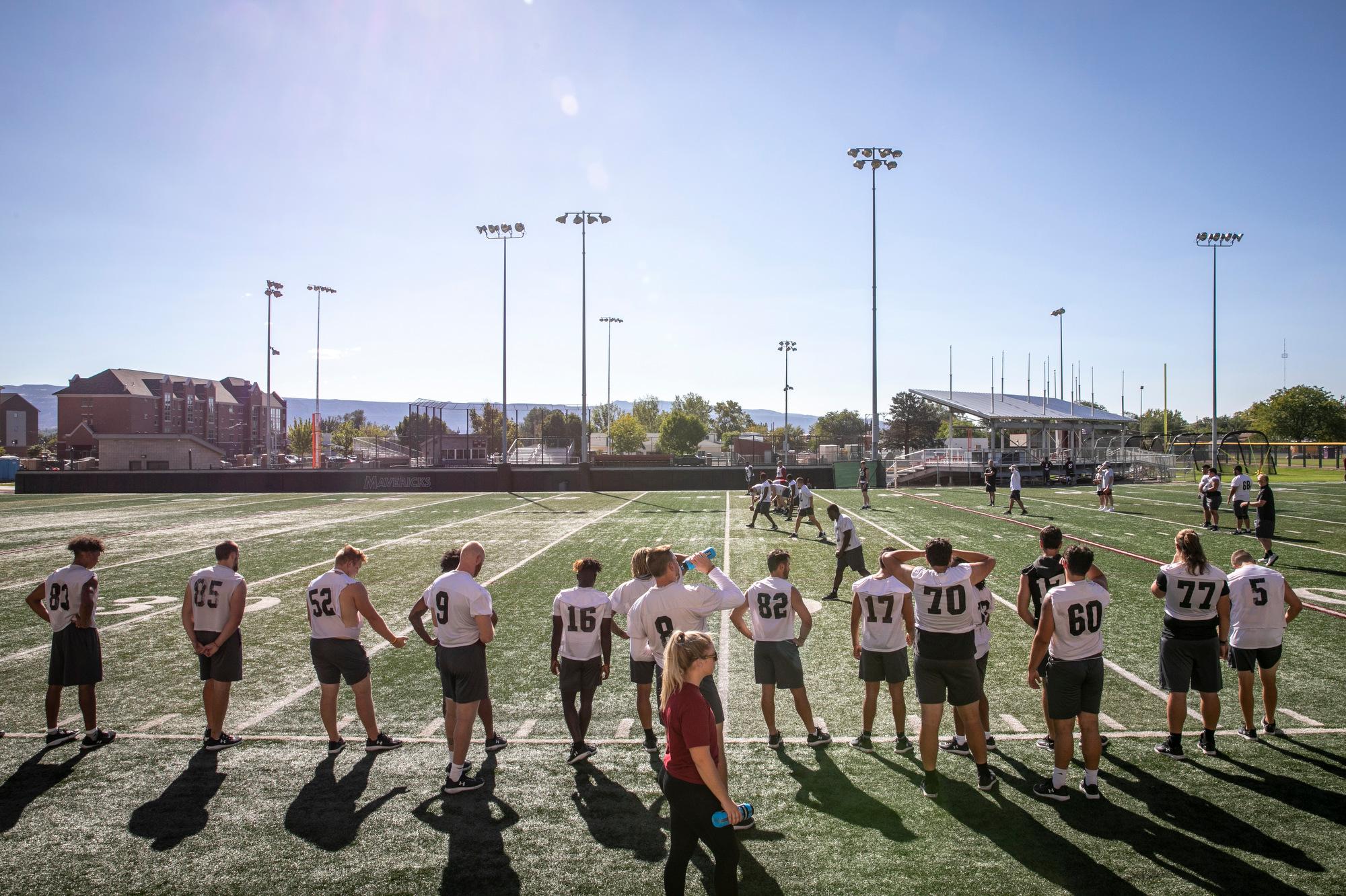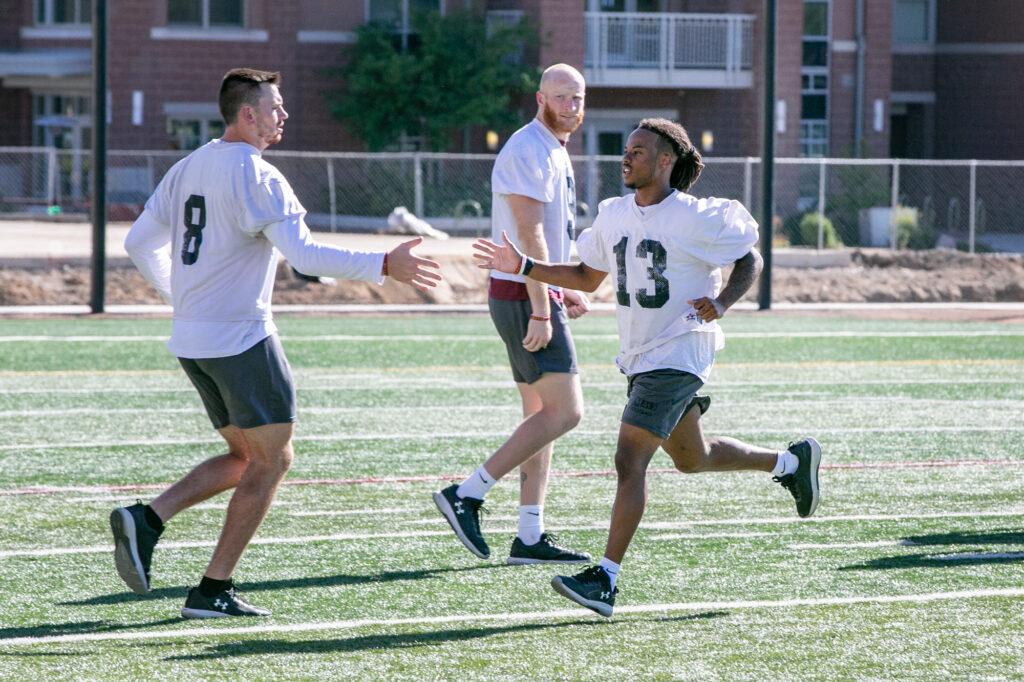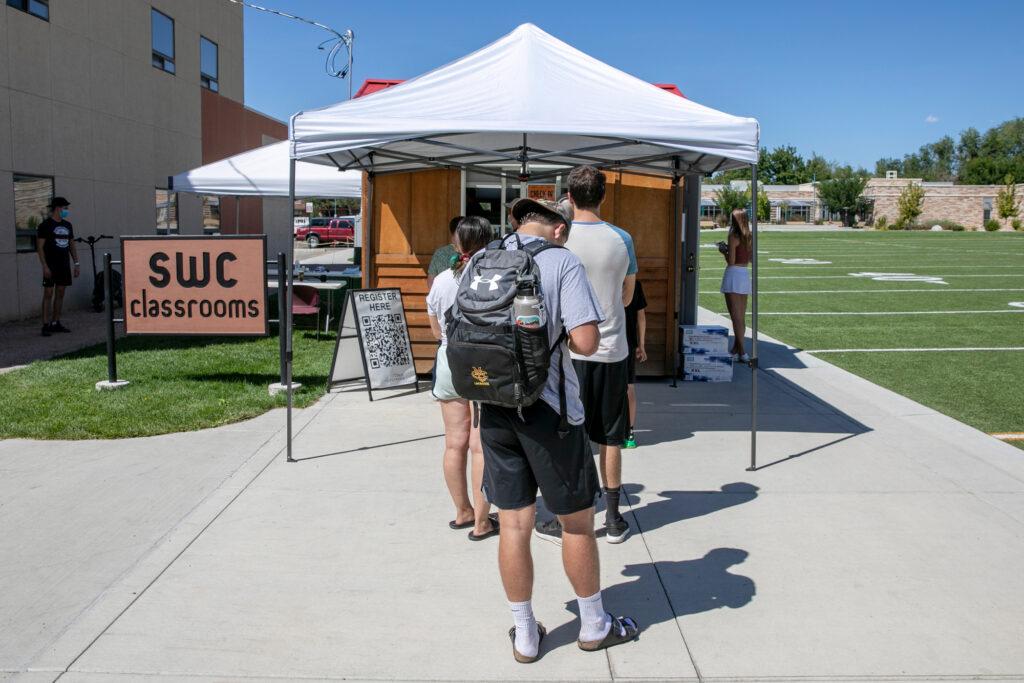
Torren Calhoun had no intention of getting a COVID-19 shot.
Calhoun, 23, plays football at Colorado Mesa University, a school of about 11,000 students in Grand Junction. The junior said his opposition to receiving the vaccination stemmed from a long record of medical experiments imposed on Black people in America.
“It comes from a long history of traumas and things that happened to Black people, which is why my mom and my grandma, who is a nurse, are leery towards anything that has to do with anything medical.”
His teammate, 22-year-old KJ Sapp, wasn’t totally against the shot, but he wasn’t in any kind of hurry, either.
“I was just indifferent. I didn't know much about it,” Sapp said. “I wasn't going to get it out of random curiosity, but I wasn't against it either.” He didn’t consider himself “anti-vax,” he just wanted to take his time and see whether getting vaccinated was something he needed to do.

.
But then, shortly after practices started in mid-August, the team was invited to a meeting with two university faculty members who have medical expertise. Michael Reeder is a specialist in sports medicine and former team doctor; Amy Bronson heads the university’s physician assistant program.
Immediately after the meeting, 26 players, including Sapp and Calhoun, got their shots. Altogether, team officials say, 81 percent of the team’s 129 members are now vaccinated.
Sapp said football logistics played a big part in his decision. While unvaccinated players will be allowed to play this season, they’ll face tighter rules, including more testing. “I didn’t want to have to sit out any games this year. We only have 10 solidified games and I want to be in all of them.”
The conversation with the football players was just one of many the university is having with students this school year. It’s an approach that John Marshall, the university’s president, supports.
“Simply telling everybody what they shall and shall not do doesn't work very well,” Marshall said. “These are adults we're talking about. And so we've got to come together with a collective sense of community and responsibility to each other and engage in that difficult conversation.”
In Mesa County, where the school is located, about half of the population have received at least one shot. But only about 35 percent of people ages 20-29 have chosen to get the jab. And while cases slowed in the county earlier this summer, there has been a sharp increase since K-12 schools, and then Mesa, reopened last month. So far, Mesa has reported 29 cases.
Marshall joined Colorado Mesa University in 2007. When the pandemic began in March 2020, he was vice president for student services. At Spring Break, the university closed and sent students home to resume that semester’s classes online. It soon became clear that that wasn’t working well.
“One of the things you have to appreciate about Colorado Mesa University is that two-thirds of our students are going to be first in their family to go to college, low-income or students of color,” Marshall said.
Shortly after the university sent everyone home, they began surveying students to see how they were adjusting to the change. They asked how the students were doing, and whether the students had laptops and access to the internet. “What we heard in very clear response from those students is it's not going well,” continued Marshall. “We knew within a few weeks, we had to find a way to get back in person.”

Along with Bronson, Marshall co-chaired the virus prevention and detection program, called The Maverick Way, which required everyone to wear masks and get tested regularly. The university also developed an app that reported each student’s daily status to university officials and faculty. Students were grouped into small cohorts with their closest academic and social contacts. The engineering department spearheaded a wastewater-testing effort to detect the virus before students started experiencing symptoms.
This year, the virus prevention and detection program looks different. Students will be encouraged, but not required, to wear masks. Marshall argues that the combination of students and staff who have been vaccinated or have had the virus provides 80-90 percent protection. While Mesa County reported the state’s first case of the Delta variant in May, reinfection and breakthrough cases have remained relatively low, he said.
That frees the university to ease up on some of its other protocols. Rather than logging in to the app every day, students will use it only to report active symptoms. They will be less restricted in their cohorts, known as Mavilies — a nod to the Mavericks, the name of the university’s sports teams. There will be technical changes to the wastewater testing, too.
Marshall acknowledges the rules may get tighter if the virus starts to spin out of control. “Are we seeing, say, new conditions? For instance, are we seeing young people getting reinfected in a meaningful way? That would be new and different information and that would be really important for us,” he said. “The same would be true for breakthrough cases. If all of a sudden we started to see significant breakthrough cases in young people, that would be an important and new piece of information.”
But, he said, it’s important to keep classrooms open and accessible to the university’s student population. “A year ago we were sitting here and, and frankly, you know, some of the same critics were saying, ‘you guys should be online. You should have singles in all your dorm rooms, and shouldn't be playing sports.’ We pushed ahead and so here we are a year later, we're cutting a little bit of a different path.”









